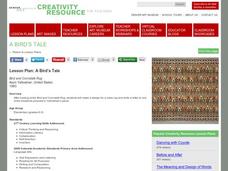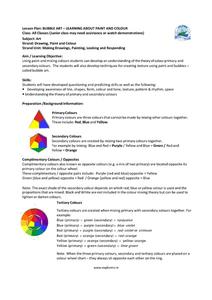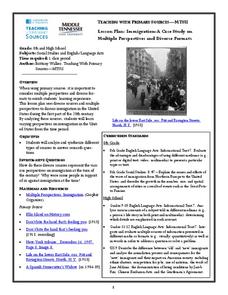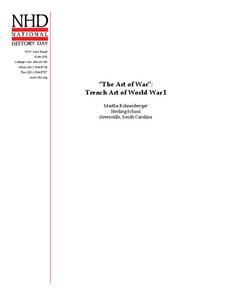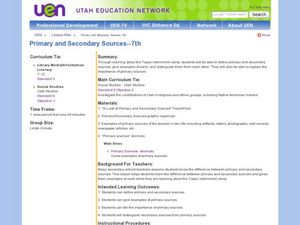Spring Branch Independent School District
Elementary Art Curriculum Guide
Get crafting with hundreds of pages of art lessons! The plans are organized into topics, which include clay, drawing, composition and design, mixed media, painting, printmaking, and paper.
Idaho State Department of Education
Lessons for Social Studies Educators
Point of view, purpose, and tone: three concepts readers of primary and secondary source materials must take into account when examining documents. Class members view a PowerPoint presentation and use the SOAPS strategy to identify an...
Curated OER
A Glimmer of Beauty: Lesson Plan
Fully analyze the elements of art and unexpected beauty in the William Merritt Chase's Still Life with a Fish. The class will examine the painting very closely, then use photography to express unexpected beauty in still life. This is a...
George W. Bush Presidential Library and Museum
Teaching Primary and Secondary Sources
What makes a source primary or secondary? Middle schoolers read a definition of each term before exploring different examples and applying their knowledge to a research project.
Historic New Orleans Collection
Exploring Primary Sources: Music in New Orleans
Looking for a new and exciting way to teach young historians the art of primary source analysis? Jazz up your lesson plan with a resource that asks class members to analyze photos, travel documents, and letters written by some of New...
Scholastic
Quick as a Cricket Lesson Plan
Teaching young learners about similes is easy as pie with this primary grade language arts activity. Following a class reading of the children's book, Quick as a Cricket by Audrey Wood, young readers learn the definition of a simile as...
Curated OER
Black Tiger Academy Martial Arts Fitness Unit - Lesson 20
“A primary reason for communication is to reach UNDERSTANDING — not necessarily AGREEMENT.” Black Tiger Academy’s final martial arts lesson plan of 20 is bringing it all together to review what has been learned in the previous 19...
Curated OER
Tintin and I: Primary and Secondary Sources
Mickey Mouse, Elmo, and Tintin? Belgian cartoonist Georges (Herge) Remi’s famous comic character launches a study of primary and secondary source material and the impact these sources have on storytelling. Class members also examine the...
Curated OER
Lesson Plan: A Bird's Tale
Who wouldn't love to get a letter from a blue bird? Elementary art enthusiasts analyze the social and historical context of Ason Yellowhair's Navajo piece, Bird and Cornstalk Rug. They examine the construction and images on the rug...
Marine Institute
Bubble Art – Learning About Paint and Color
To gain an understanding of color mixing theory and the color wheel, young artists draw a picture, mix up a batch of secondary colors to which they add dish soap, and using straws, bubble up the paint. They then press their drawings onto...
The New York Times
Teaching the Vietnam War with Primary Sources from the New York Times
Use the New York Times database of primary sources to teach a unit on the Vietnam War. The resource consists of a variety of primary sources as well as a lesson plan showcasing how to teach a instructional activity using them. Pupils...
National Endowment for the Humanities
The Metamorphoses and Later Works of Art: A Comparison of Mythic Imagery
In a lesson on The Metamorphoses, scholars compare how graphic artists use mythic imagery to represent Ovid's tales. Each group selects a work of art paired with Ovid's version of a myth and compares how both present the story.
Curated OER
Communities in Crisis Lesson 1: Primary Source? What is That?
Distinguish between primary and secondary source documents using the theme of philanthropy. Middle schoolers discuss Anne Frank: The Diary of Young Girl as a way to study the past using a primary source. Then they investigate how to...
Middle Tennessee State University
Lesson Plan: Immigration: A Case Study on Multiple Perspectives and Diverse Formats
As part of a case study of U.S. immigration during the first part of the 20th century, class members examine a variety of primary sources that present multiple perspectives of the responses of those in favor of immigration and those...
Curated OER
Using Primary Sources to Study the Holocaust
Engage your middle schoolers with Pastor Martin Niemoller's famous poem that begins, "First they came for the communists." Now that you have their attention, send learners to the various work stations you created to have them explore...
Curated OER
Lesson: Double Album: The Collection and the Archive
An open discussion starts this activity off. The class takes a critical look at five works of art that demonstrate the impact and purpose of identity through collections or archives. They then write a list or draw 10-15 items found in...
Houghton Mifflin Harcourt
Nature Walk: English Language Development Lessons (Theme 2)
Walking in nature is the theme of a unit designed to support English language development lessons. Scholars look, write, speak, and move to explore topics such as camping, woodland animals, instruments, bodies of water, things found at a...
National History Day
“The Art of War”: Trench Art of World War I
Teach pupils how veterans used art to deal with PTSD and shell-shock from trench warfare during World War I. Scholars use graphic organizers, a cartoon analysis sheet, and their own inferences to analyze primary source art work by veterans.
Curated OER
Lesson 2-Profiles in Courage: To Kill A Mockingbird and the Scottsboro Boys Trial
Review one of the most memorable cases in the history of the United States. After reading To Kill A Mockingbird, young scholars read and select court transcripts and other primary source material from the Scottsboro Boys Trial of 1933....
Curated OER
Reading Primary Source Documents: Historical Content
Why do we read primary source documents? What can they give us that other writings cannot? Provide your learners with any of the primary sources attached here (there are seven), and have them complete the graphic organizer (which opens...
Curated OER
Primary and Secondary Sources - 7th
A link to a beautiful Animoto presentation is included, giving examples of primary sources that a student might want to contact when doing research. Using the Topaz Internment Camp in Utah as a sample topic, middle schoolers view a slide...
Curated OER
Understanding and Using Primary and Secondary Sources in History
Explore primary and secondary sources in this historical analysis lesson. Young researchers define the terms primary source and secondary source. They read a primary source document provided by the teacher and answer questions about the...
Curated OER
A Primary Source Picture Book
Travel through Europe with ten-year-old Teddy Roosevelt in this writing activity, which uses the picture book My Tour of Europe: by Teddy Roosevelt, by Ellen Jackson. After reading the book, readers compare it to passages from The...
Curated OER
Lesson 8: Prithee, Pause!
High school learners examine primary source materials on history and the supernatural which relate to Julius Caesar. They then act out a scene based on different historical understandings and identify facts, theories, and similarities in...
Other popular searches
- Art Lessons Primary
- Art Lessons Primary Penguins
- Edible Art Lessons Primary
- Art Lessons Primary Easter
- 3d Art Lessons Primary
- Art Lessons Primary Fruit
- Winter Art Lessons Primary
- Maori Art Lessons Primary
- Visual Art Lessons Primary
- Art Lessons Primary Tiger
- Art Lessons Primary Water
- Art Lessons Primary Victoria










